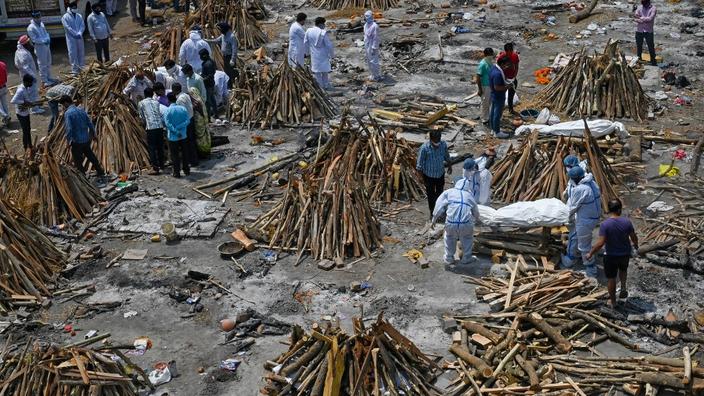Government statistics assure it: the Covid-19 would have caused the death of 484,213 Indians as of January 10.
A heavy toll that must be put into perspective with the 1.38 billion inhabitants who make up the country and the nearly 36 million Indians infected with the virus since the start of the pandemic.
These official data are, however, called into question by a new study published on Friday in the journal
Science
.
Read alsoIndia refuses to count its millions of deaths from Covid-19
From the start of the pandemic, in September 2021, "
the deaths of Covid-19 in India are six to seven times more important than those officially registered
", affirms the study. This would mean that the deaths of Covid-19 would number in the millions in the country. A turnaround when an "
Indian paradox
" had been pointed out by scientists in an attempt to explain the low death rate in the country. "
We were wrong
," said Prabhat Jha, who led the new study but long believed the country had been spared the worst forms of the virus. The professor of epidemiology at the University of Toronto told the American television station NBC that he "
had trouble understanding
Why the numbers were so low.
"
But when we started to look at the matter, we found that there were obviously some missing deaths
," he added.
Lack of reliable data and political will
According to the eleven scientists who participated in the new study, Covid-19 would have caused 3.2 million deaths in India between June 2020 and July 2021, most (around 2.7 million) having occurred between April 2021 and July 2021. To come up with that figure, the researchers looked at India's usual mortality, which sits just below 10 million annual deaths. Then they called on a polling institute, which interviewed nearly 140,000 Indians by telephone between March 2020 and July 2021. The study assures us: this makes it possible to cover more than 98% of the population. Pollsters asked everyone if a member of their household had died from Covid-19 and then researchers compared the responses with official data. It emerged that most of the time,the figures reported by the government were much lower than reality.
Read also India: a net placed across the Ganges to collect Covid-19 deaths
For Prabhat Jha, this can be explained by a lack of data reporting by families and medical establishments to the authorities.
"
Of the 10 million deaths in India estimated by India in 2020, more than three million have not been registered and more than eight million have not been the subject of a medical certificate,
" reports the study.
This is all the more true in the most rural parts of the country.
A BBC report in India last June showed crowded crematoriums and said many people who died were unable to be tested for Covid-19.
According to the professor of epidemiology, this factor cannot explain everything. "
The Indian government seems to be trying to stifle the numbers in the way it records Covid-19 deaths
", assures the researcher. Last July, a study concluded that the Covid-19 epidemic had killed between 3.4 and 4.7 million people. Very quickly, the government vigorously contested these figures, arguing that it was impossible to establish statistics from a sample, because of the differences between the regions of the country. The executive had even declared that "
a failure in the counting of the dead [was] improbable
". However, the government also admitted simply "to
compile and publish the data sent by regional governments
Which may have gaps.









